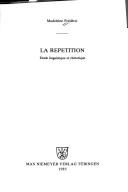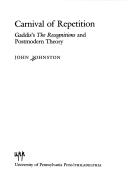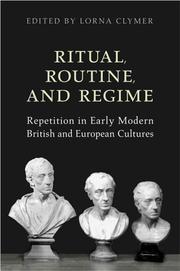| Listing 1 - 10 of 39 | << page >> |
Sort by
|
Book
ISBN: 1283142414 9786613142412 1443827924 9781443827928 9781283142410 1443826626 9781443826624 6613142417 Year: 2011 Publisher: Newcastle upon Tyne Cambridge Scholars Pub.
Abstract | Keywords | Export | Availability | Bookmark
 Loading...
Loading...Choose an application
- Reference Manager
- EndNote
- RefWorks (Direct export to RefWorks)
This book explores how experienced authors repeat word forms in three different genres: research articles, short stories and political speeches. Methods from corpus linguistics are used to elicit all the repeated word forms in each text and then the material is analysed to establish the nature of the repetitions. The analysis seeks answers to the questions: in what naming complexes are the words repeated; is the same concept evoked; is the referential type repeated; are there metaphoric, prag...
Repetition in literature. --- Repetition (Rhetoric) --- Rhetoric --- Literary style

ISSN: 00845396 ISBN: 3484521996 3111590194 9783484521995 Year: 1985 Volume: 199 Publisher: Tübingen: Niemeyer,
Abstract | Keywords | Export | Availability | Bookmark
 Loading...
Loading...Choose an application
- Reference Manager
- EndNote
- RefWorks (Direct export to RefWorks)
Linguistics --- Literary rhetorics --- Stilistics --- retoriek --- Repetition (Rhetoric) --- Répétition (Rhétorique) --- Rhetoric --- Style, Literary --- Repetition (Rhetoric). --- Répétition (Rhétorique) --- Literary style --- Répétition [Rhétorique]. --- Herhaling [Redekunst]. --- RHETORIQUE --- REPETITION
Book
ISBN: 9780748669677 0748669671 9780748669684 074866968X 9780748646784 0748646787 9780748646777 0748646779 1299483828 9781299483828 Year: 2013 Publisher: Edinburgh : Edinburgh University Press,
Abstract | Keywords | Export | Availability | Bookmark
 Loading...
Loading...Choose an application
- Reference Manager
- EndNote
- RefWorks (Direct export to RefWorks)
When students read Difference and Repetition for the first time, they face two main hurdles: the wide range of sources that Deleuze draws upon and his dense writing style. This Edinburgh Philosophical Guide helps students to negotiate these hurdles, taking them through the text step by step. It situates Deleuze within Continental philosophy more broadly and explains why he develops his philosophy in his unique way. Seasoned Deleuzians will also be interested in Somers-Hall's new, positive interpretation of Difference and Repetition .
Difference (Philosophy) --- Repetition (Philosophy) --- Philosophy --- Deleuze, Gilles,
Book
ISBN: 9782753506862 2753506868 Year: 2008 Publisher: Rennes: Presses universitaires de Rennes,
Abstract | Keywords | Export | Availability | Bookmark
 Loading...
Loading...Choose an application
- Reference Manager
- EndNote
- RefWorks (Direct export to RefWorks)
"Reformuler, c'est formuler à nouveau et ou formuler différemment, peut-on lire dans les dictionnaires : or, si le préfixe re- a bien pour une de ses acceptions celle d'itération, formuler, en revanche, engage toujours une situation d'énonciation singulière, forcément unique et distinctive. La reformulation s'inscrit donc dans un processus particulier qui, dans le même temps qu'il pose un dit nouveau, re-dit un propos antérieur. Ainsi, la reformulation impose-t-elle dans on mieux-dit du déjà-dit, et c'est ce phénomène langagier si partciulier qui a retenu l'attention des recherches présentées dans ce volume. De la paraphrase à la glose méta-énonciative, les études des années quatre-vingt/quatre-vingt-dix sont marquées par l'apport de nouveaux outils de description ; et ont vu la diversification des points de vue disciplinaires, ainsi que des champs d'observation du dire lorsqu'il est reformulé. Ainsi, qu'elle altère, corrige ou module le déjà-dit, la reformulation est à l'oeuvre dans tous les types de discours, oraux et écrits ; signalant un mieux-dire, elle oblige aussi à prendre en considération l'étude de la cohérence des textes et discours. Cet ouvrage veut donc faire le point sur les travaux les plus récents en interrogeant le concept de reformulation sous les deux angles complémentaires des marqueurs linguistiques par lesquels elle se signale et des stratégies énonciatives dans lesquelles elle se déploie"--P. [4] of cover.
Repetition (Rhetoric) --- French language --- Dialogue analysis. --- Wiederholung. --- Paraphrase. --- Linguistics --- Discourse analysis. --- Repetition (Rhetoric). --- Linguistics.

ISBN: 0812281799 1512806420 Year: 1990 Publisher: Philadelphia (Pa.) : University of Pennsylvania press,
Abstract | Keywords | Export | Availability | Bookmark
 Loading...
Loading...Choose an application
- Reference Manager
- EndNote
- RefWorks (Direct export to RefWorks)
Gaddis, William --- Repetition (Rhetoric). --- Fiction --- Postmodernism (Literature) --- Technique.

ISBN: 1281991732 9786611991739 1442679409 9781442679405 9781281991737 0802090303 9780802090300 0802004598 Year: 2006 Publisher: Toronto ; Buffalo, [New York] ; London : University of Toronto Press,
Abstract | Keywords | Export | Availability | Bookmark
 Loading...
Loading...Choose an application
- Reference Manager
- EndNote
- RefWorks (Direct export to RefWorks)
Providing a stimulating, new perspective on early modern culture, the collection describes repetition's often peculiar demands, its surprising gratifications, and its contested interpretations.
Repetition (Aesthetics) --- Repetition (Philosophy) --- Repetition in literature. --- Repetition in music. --- Humanities --- Learning and scholarship --- Classical education --- Composition (Music) --- Literary style --- Philosophy --- Aesthetics --- History --- Somerset (England) --- Sources. --- Somerset, Eng. --- Somersetshire (England)
Book
ISBN: 1317059654 1315607565 1317059646 9781317059646 9781315607566 9781317059653 9781317059639 1317059638 9781472475374 1472475372 Year: 2018 Publisher: London Routledge, Taylor & Francis Group
Abstract | Keywords | Export | Availability | Bookmark
 Loading...
Loading...Choose an application
- Reference Manager
- EndNote
- RefWorks (Direct export to RefWorks)
"Music abounds in twentieth- century Irish literature. Whether it be the "thought-tormented" music of Joyce's "The Dead", the folk tunes and opera that resound throughout Ulysses, or the four- part threnody in Beckett's Watt, it is clear that the influence of music on the written word in Ireland is deeply significant. Samuel Beckett arguably went further than any other writer in the incorporation of musical ideas into his work. Musical quotations inhabit his texts, and structural devices such as the da capo are metaphorically employed. Perhaps most striking is the erosion of explicit meaning in Beckett's later prose brought about through an extensive use of repetition, influenced by his reading of Schopenhauer's philosophy of music. Exploring this notion of "semantic fluidity", John McGrath discusses the ways in which Beckett utilised extreme repetition to create texts that operate and are received more like music. Beckett's writing has attracted the attention of numerous contemporary composers and an investigation into how this Beckettian "musicalised fiction" has been retranslated into contemporary music forms the second half of the book. Close analyses of the Beckett- inspired music of experimental composer Morton Feldman and the structured improvisations of avantjazz guitarist Scott Fields illustrate the cross- genre appeal of Beckett to musicians, but also demonstrate how repetition operates in diverse ways. Through the examination of the pivotal role of repetition in both modernist music and literature of the twentieth century, John McGrath's book is a significant contribution to the field of Word and Music Studies."--Provided by publisher
Music and literature. --- Music --- Repetition in literature. --- Repetition in music. --- History and criticism. --- Beckett, Samuel, --- Criticism and interpretation. --- Beckett, Samuel
Multi
ISBN: 9055736821 Year: 2006 Publisher: Budel : Damon,
Abstract | Keywords | Export | Availability | Bookmark
 Loading...
Loading...Choose an application
- Reference Manager
- EndNote
- RefWorks (Direct export to RefWorks)
Heidegger, Martin --- Heidegger, Martin. --- Contributions in concept of freedom --- Heidegger, Martin, --- Repetition (Philosophy) --- Philosophy
Book
ISBN: 0190464402 0190464399 0190464380 9780190464400 9780190464394 9780190464387 0190620404 Year: 2016 Publisher: New York, NY
Abstract | Keywords | Export | Availability | Bookmark
 Loading...
Loading...Choose an application
- Reference Manager
- EndNote
- RefWorks (Direct export to RefWorks)
Repetition and Race shows how texts by Theresa Cha, Susan Choi, Karen Tei Yamashita, Chang-rae Lee, and Maxine Hong Kingston use structures of repetition to register and respond to the widespread institutionalization of liberal multiculturalism.
American literature --- Repetition in literature. --- Multiculturalism in literature. --- Literary style --- Asian American authors --- History and criticism.
Book
ISBN: 1282268473 9786612268472 0191550248 9780191550249 6612268476 9780199214198 0199214190 9781282268470 Year: 2009 Publisher: Oxford Oxford University Press
Abstract | Keywords | Export | Availability | Bookmark
 Loading...
Loading...Choose an application
- Reference Manager
- EndNote
- RefWorks (Direct export to RefWorks)
These two complementary works give the reader a unique insight into the breadth and substance of Kierkegaard's thought. One reads like a novel and the other a Platonic dialogue but both concern the nature of love, faith, and happiness. These are the first translations to convey the literary quality and philosophical precision of the originals. - ;'The love of repetition is in truth the only happy love'So says Constantine Constantius on the first page of Kierkegaard's Repetition. Life itself, according to Kierkegaard's pseudonymous narrator, is a repetition, and in the course of this witty, pla
Love --- Time --- Identity (Philosophical concept) --- Christianity --- Repetition (Philosophy) --- Philosophy --- Identity --- Comparison (Philosophy) --- Resemblance (Philosophy) --- Philosophy.
| Listing 1 - 10 of 39 | << page >> |
Sort by
|

 Search
Search Feedback
Feedback About UniCat
About UniCat  Help
Help News
News